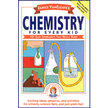 Ions are atoms or molecules that have a net charge, either positive or negative. There are two kinds of ions:
Ions are atoms or molecules that have a net charge, either positive or negative. There are two kinds of ions:
Anions are negatively charged ions because they have negative net charges. This means that there is a greater number of electrons (-) than protons (+). For example, the anion, fluoride (F 1-), has a one negative charge because it has a total of nine protons and ten electrons. Thus, the net charge for fluoride is 1 negative.
Cations are positively charged ions because they have positive net charges. This is due to these ions having more protons (positive charges) than electrons (negative charges). For example, calcium (Ca 2+) is a cation ion with 20 protons and 18 electrons. The net charge for Calcium is 2 positive.
 |
Chemistry For Every Kid |
 |
A+ Projects in Chemistry |